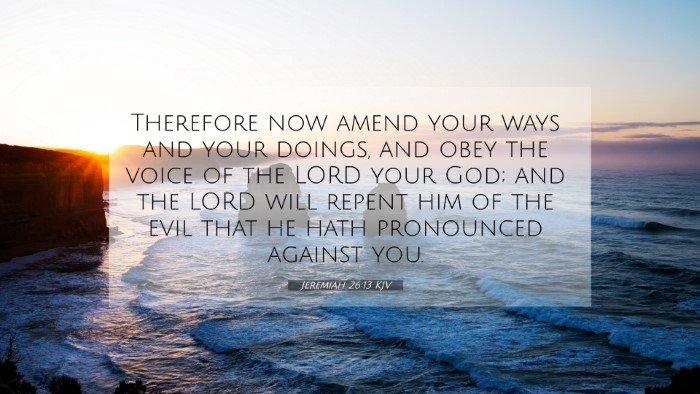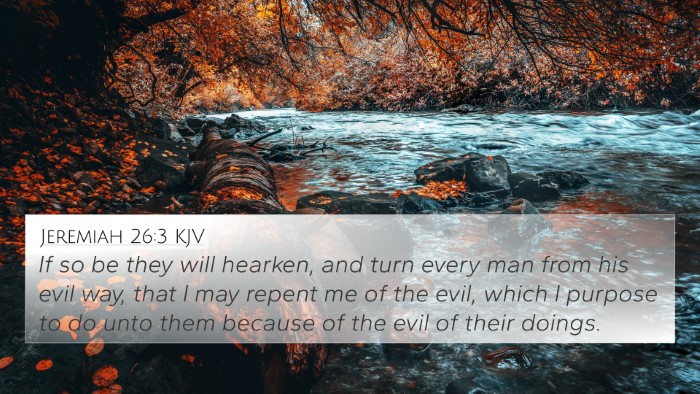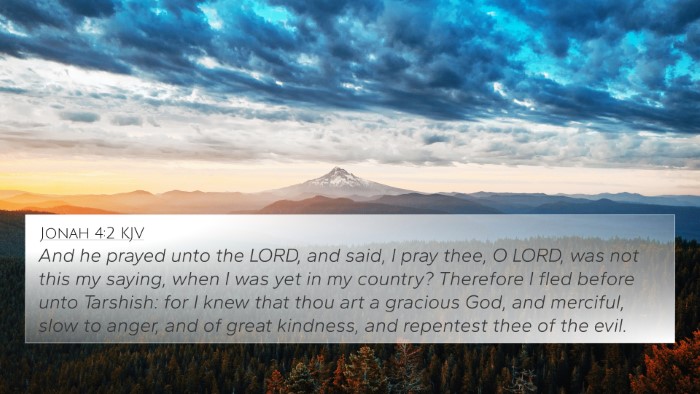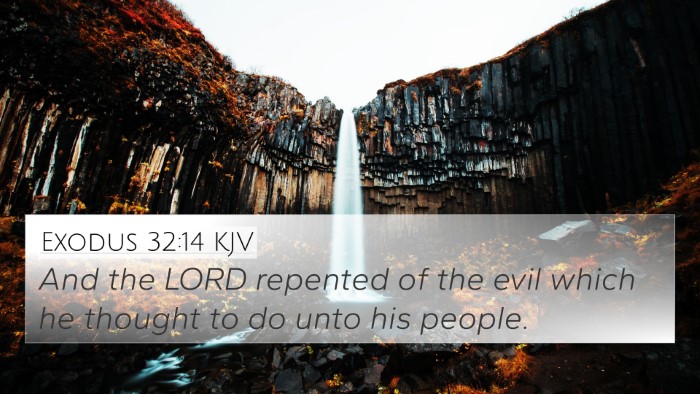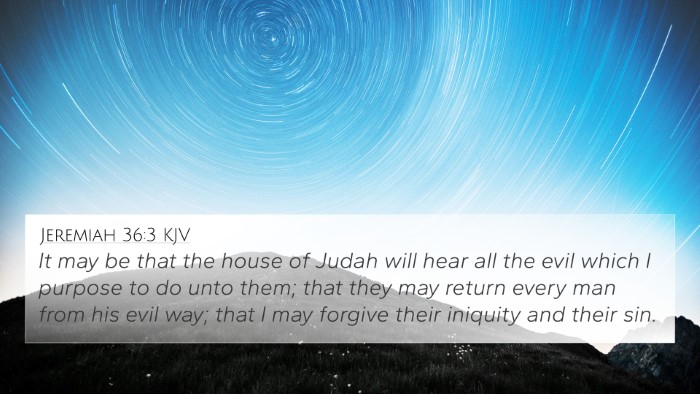Jeremiah 26:13 - Summary and Interpretation
Verse Context: Jeremiah 26:13 reads, "Now therefore amend your ways and your doings, and obey the voice of the Lord your God; and the Lord will repent him of the evil that he hath pronounced against you." This verse is part of a larger narrative where the prophet Jeremiah is delivering a message of warning to the people of Judah about their actions and the impending judgment from God.
Exegesis and Analysis
This verse emphasizes the call to repentance, which is a recurring theme throughout the Scriptures. According to Matthew Henry, the message here serves as a divine warning; it underscores the importance of aligning one’s life with God’s commandments. The phrase "amend your ways" implies a sincere desire for change and a turning away from sinful pursuits.
Albert Barnes highlights that the term "obey the voice of the Lord" indicates not just passive listening, but an active compliance with God's instructions. This reflects the relational aspect of obedience that is more than just ritualistic adherence to law; it's about a heartfelt commitment to God.
Adam Clarke adds that God's willingness to "repent" of the evil threatens shows His readiness to withhold judgment if the people respond correctly. This illustrates God’s mercy and His desire for humanity to return to Him rather than face punishment.
Thematic Connections
Jeremiah 26:13 is foundational for understanding biblical repentance and the consequences of disobedience. The call to action reflects a key motif seen throughout the Bible:
- 2 Chronicles 7:14: "If my people, which are called by my name, shall humble themselves, and pray, and seek my face, and turn from their wicked ways; then will I hear from heaven, and will forgive their sin, and will heal their land."
- Ezekiel 18:30: "Therefore I will judge you, O house of Israel, every one according to his ways, saith the Lord God. Repent, and turn yourselves from all your offenses; so sin shall not be your ruin."
- Acts 3:19: "Repent therefore, and be converted, that your sins may be blotted out, so that times of refreshing may come from the presence of the Lord."
- 1 John 1:9: "If we confess our sins, he is faithful and just to forgive us our sins, and to cleanse us from all unrighteousness."
- Luke 13:3: "I tell you, Nay: but, except ye repent, ye shall all likewise perish."
- Matthew 3:2: "And saying, Repent ye: for the kingdom of heaven is at hand."
- James 4:8: "Draw nigh to God, and he will draw nigh to you. Cleanse your hands, ye sinners; and purify your hearts, ye double minded."
Understanding and Application
For those seeking to grasp the meaning of Jeremiah 26:13, it can be understood that true repentance requires action—amending one's ways and adhering to God's instruction leads to divine mercy. This is a significant theme in both the Old and New Testaments.
Moreover, the concept of God's willingness to "repent" of planned judgment if His people change their behavior emphasizes a relational theology where the faithful response of humans can influence God's actions. This truth can be encouraging for individuals and communities striving to correct their paths.
Cross-Referencing and Connections
When studying this verse, one can utilize various tools for Bible cross-referencing to explore deeper meanings and themes:
- Utilize a Bible concordance to find related verses.
- Refer to a cross-reference Bible study guide for comprehensive connections.
- Leverage a Bible cross-reference system for structured study.
Rich Textual Dialogue
The connections between the Old Testament and New Testament can be explored through careful study of these verses. One might wonder:
- What verses are related to Jeremiah 26:13?
- How can we find cross-references for prophetic warnings and repentance?
- How do the themes of repentance in the Gospels reflect the warnings given by Jeremiah?
Conclusion
In summary, Jeremiah 26:13 stands as a poignant reminder of the call to repentance and the hope of divine mercy. The verse serves not only as a historical warning to the people of Judah but also as an enduring lesson for all believers today. By understanding this verse through the lens of cross-referencing, one gains insights into the broader biblical narrative of redemption and obedience.


